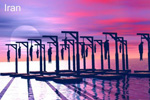 Townhall: With all of the back and forth between Congress and the White House on the Iranian nuclear deal, it is critically important for all involved in the debate – and all Americans – to remember with whom we are dealing when making deals with the Iranian regime. August marks anniversary of the massacre of tens of thousands of political prisoners by the Iranian regime in 1988.
Townhall: With all of the back and forth between Congress and the White House on the Iranian nuclear deal, it is critically important for all involved in the debate – and all Americans – to remember with whom we are dealing when making deals with the Iranian regime. August marks anniversary of the massacre of tens of thousands of political prisoners by the Iranian regime in 1988.
Townhall.com
Hamid Yazdan Panah
 With all of the back and forth between Congress and the White House on the Iranian nuclear deal, it is critically important for all involved in the debate – and all Americans – to remember with whom we are dealing when making deals with the Iranian regime.
With all of the back and forth between Congress and the White House on the Iranian nuclear deal, it is critically important for all involved in the debate – and all Americans – to remember with whom we are dealing when making deals with the Iranian regime.
August marks anniversary of the massacre of tens of thousands of political prisoners by the Iranian regime in 1988. The shock and terror inflicted on the Iranian nation when this manifest case of crime against humanity, perpetrated in a spate of a few months, went unnoticed in the international sphere, and unresolved in the Iranian psyche. The legacy of this carnage has resulted in the survival of a despotic regime, and the stunted growth of a nation.
In order to understand the effect of the 1988 massacre, it is necessary to understand the historical context of 1980s Iran. A decade that began with the highest of aspirations following the 1979 revolution, turned into a nightmarish tragedy. Ayatollah Ruhollah Khomeini came to Iran with religious sanctity that was unparalleled, but his betrayal of the people’s trust has instilled a cynicism towards politics in Iranians that continues to this day. And the war with Iraq which started in 1980 also was used by the mullahs to suppress criticism and justify their expansion of power.
The massacre itself has never been formally investigated, and remains shrouded in mystery. Some estimates place the number of killed as high as 30,000. To date, the most damning evidence has come from within the ruling clergy itself, from Grand Ayatollah Hossein-Ali Montazeri who lost his status as Khomeini’s successor by denouncing the massacre.
The orders for the systematic execution of dissidents came from Khomeini himself in the form of a fatwa (religious decree), and was meant to purge the country of any opposition, notably the main Iranian opposition movement, the Mujahedin-e Khalq (MEK). Along with the MEK, many leftist activists were executed for refusing to renounce their beliefs during Kangaroo trials which lasted no more than a few minutes. Many of the executed prisoners had already been sentenced to serve prison terms for their political defiance.
Kamal Afkhami Ardekani, former senior official at the notorious Evin prison in Tehran told United Nations human rights rapporteurs, “They would line up prisoners in a 14-by-five-metre hall in the central office building and then ask simply one question, ‘What is your political affiliation?’ Those who said the Mojahedin would be hanged from cranes in position in the car park behind the building.” Amnesty International has noted that more than a quarter century after the massacre, the regime continues to suppress any information about the killings, arresting family members who dare to speak out or visit mass graves at the Khavaran cemetery.
The shock of such a brutal and systematic massacre left the country paralyzed with fear, silenced and, at the same, anger. The trauma has been passed on to the younger generation as well. Children of that era grew up between a bloody war and the horrors of their government. Some would only hear about the execution of their relatives from neighbors or classmates, because their own families were too afraid to speak of it. Some still live in denial, carrying hope 26 years later that their loved ones somehow managed to escape into hiding.
The massacre in the 1980s served the regime’s short term and long term interests of legitimization and survival through violence and terror. This policy has continued to this day. And it is no coincidence that Iran continues to execute individuals in public, and leads the world in per capita executions, nearly 900 since Hassan Rouhani became president.
Sadly, for many Iranians it is as if they are hoping to wake up from a nightmare, but this detachment, this wishful thinking, is not a solution to the problems our nation faces. It is time to accept the truth of what occurred and continues to occur in Iran, and resolve to move forward to end such inhumanities once and for all by ousting the criminals who rule Iran today. Those that had the courage to stand up to the regime under the most horrific conditions should be remembered as heroes, and their legacy should inspire us to break our inexplicable silence.
Regrettably, the West has utterly failed to hold the murderous clerical rulers to account for this horrific crime. Iranians demand an investigation by the United Nations into the 1988 massacre in order to bring the perpetrators to justice. The world community owes that to the Iranian people and the victims’ families.
Hamid Yazdan Panah is an attorney and human rights activist from the San Francisco Bay Area.


